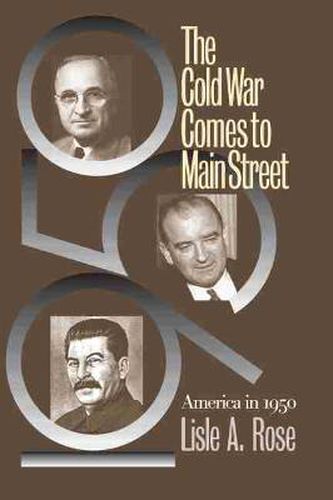Readings Newsletter
Become a Readings Member to make your shopping experience even easier.
Sign in or sign up for free!
You’re not far away from qualifying for FREE standard shipping within Australia
You’ve qualified for FREE standard shipping within Australia
The cart is loading…






This title is printed to order. This book may have been self-published. If so, we cannot guarantee the quality of the content. In the main most books will have gone through the editing process however some may not. We therefore suggest that you be aware of this before ordering this book. If in doubt check either the author or publisher’s details as we are unable to accept any returns unless they are faulty. Please contact us if you have any questions.
In 1950, Main Street America restored by victories in a global war and hopeful for a prosperous and peaceful future was abruptly traumatized. The sudden prospect of thermonuclear war with the Soviet Union, Senator Joseph McCarthy’s vicious anticommunist crusade, and the beginning of the Korean War all combined to dampen the public mood. In the wake of these events, the Cold War invaded every home and convinced millions of Americans that the liberal establishment created by Franklin Roosevelt and sustained by Harry Truman had betrayed the public trust and placed the nation in mortal peril.
Revealing the intense interplay between foreign policy, domestic politics, and public opinion, Lisle Rose argues that 1950 was a pivotal year for the nation. Thermonuclear terror brought
a clutching fear of mass death
to the forefront of public awareness, even as McCarthy’s zealous campaign to root out
subversives
destroyed a sense of national community forged in the Great Depression and World War II. The Korean War, with its dramatic oscillations between victory and defeat, put the finishing touches on the national mood of crisis and hysteria. Drawing upon recently available Russian and Chinese sources, Rose sheds much new light on the aggressive designs of Stalin, Mao, and North Korea’s Kim Il Sung in East Asia and places the American reaction to the North Korean invasion in a new and more realistic context.
Rose argues that the convergence of Korea, McCarthy, and the Bomb wounded the nation in ways from which we’ve never fully recovered. He suggests, in fact, that the convergence may have paved the way for our involvement in Vietnam and, by eroding public trust in and support for government, launched the ultra-Right’s campaign to dismantle the foundations of modern American liberalism.
Engagingly written, The Cold War Comes to Main Street is a sophisticated synthesis that cuts to the core of a half-century of postwar national paranoia. It calls into question the assumptions of several generations of scholars about foreign affairs and domestic policies and will force readers to reconsider their assumptions about just when and how the nation lost its sense of community, confidence, and civility.
$9.00 standard shipping within Australia
FREE standard shipping within Australia for orders over $100.00
Express & International shipping calculated at checkout
This title is printed to order. This book may have been self-published. If so, we cannot guarantee the quality of the content. In the main most books will have gone through the editing process however some may not. We therefore suggest that you be aware of this before ordering this book. If in doubt check either the author or publisher’s details as we are unable to accept any returns unless they are faulty. Please contact us if you have any questions.
In 1950, Main Street America restored by victories in a global war and hopeful for a prosperous and peaceful future was abruptly traumatized. The sudden prospect of thermonuclear war with the Soviet Union, Senator Joseph McCarthy’s vicious anticommunist crusade, and the beginning of the Korean War all combined to dampen the public mood. In the wake of these events, the Cold War invaded every home and convinced millions of Americans that the liberal establishment created by Franklin Roosevelt and sustained by Harry Truman had betrayed the public trust and placed the nation in mortal peril.
Revealing the intense interplay between foreign policy, domestic politics, and public opinion, Lisle Rose argues that 1950 was a pivotal year for the nation. Thermonuclear terror brought
a clutching fear of mass death
to the forefront of public awareness, even as McCarthy’s zealous campaign to root out
subversives
destroyed a sense of national community forged in the Great Depression and World War II. The Korean War, with its dramatic oscillations between victory and defeat, put the finishing touches on the national mood of crisis and hysteria. Drawing upon recently available Russian and Chinese sources, Rose sheds much new light on the aggressive designs of Stalin, Mao, and North Korea’s Kim Il Sung in East Asia and places the American reaction to the North Korean invasion in a new and more realistic context.
Rose argues that the convergence of Korea, McCarthy, and the Bomb wounded the nation in ways from which we’ve never fully recovered. He suggests, in fact, that the convergence may have paved the way for our involvement in Vietnam and, by eroding public trust in and support for government, launched the ultra-Right’s campaign to dismantle the foundations of modern American liberalism.
Engagingly written, The Cold War Comes to Main Street is a sophisticated synthesis that cuts to the core of a half-century of postwar national paranoia. It calls into question the assumptions of several generations of scholars about foreign affairs and domestic policies and will force readers to reconsider their assumptions about just when and how the nation lost its sense of community, confidence, and civility.